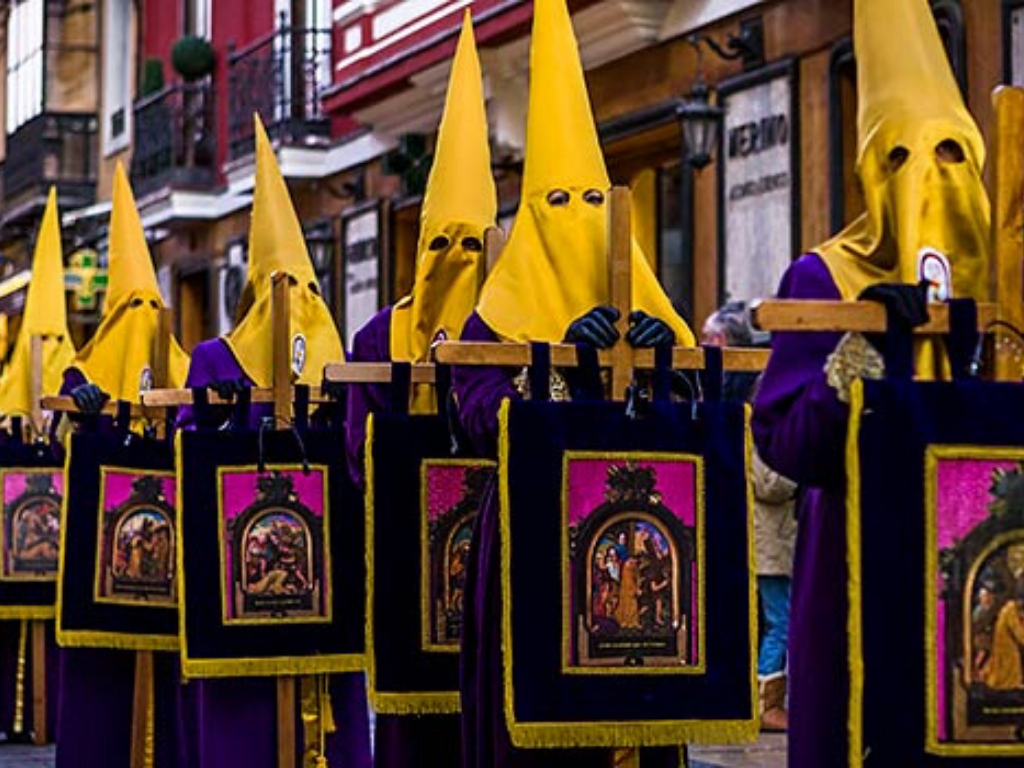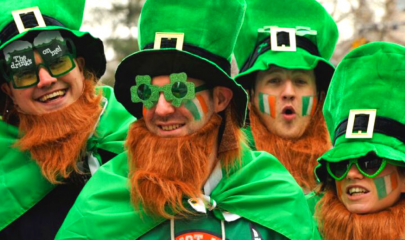We´re celebrating Easter in Spain. Get to know more about this tradition!
06-04-2020
Holy Week in Spain is one of the best known religious traditions in the world, considering itself to be of international tourist interest, which is why not only the Spanish celebrate it, but also attracts a large number of tourists from all parts of the world. What is commemorated on these dates is the Passion, death and resurrection of Jesus of Nazareth. This year due to the current health crisis the processions and events are canceled, however, you can still learn a little about this celebrations and you will have something interesting to tell at home.
This week begins with Palm Sunday. The bouquets and palms that are placed on windows and balconies are a symbol of victory, to commemorate the arrival of Jesus mounted on a donkey and received by a crowd of people who were carrying palm branches in order to greet the so-called messiah. The commemoration begins with the Eucharist on Holy Thursday. On Good Friday the Crucifixion of Jesus of Nazareth is remembered and on the night of Holy Saturday to Easter Sunday, the return to life of Jesus of Nazareth is celebrated. In Spain it is celebrated every year between the months of March and April, depending on the lunar calendar.
There are many symbols and acts that characterize this celebration, for example the processions, the costaleros, the steps, the bouquets and the palms that we mentioned before, the washing of the feet, the Paschale candle, the cross, the rabbits and the Easter eggs, and of course, the torrijas (similar to a french toast). Now we tell you a little better about each of these.
A procession is a religious act consisting of a parade through the streets of cities and towns, where the so-called "costaleros" carry images related to the passion and death of Jesus of Nazareth (the pasos). In ancient times the bags were carried by ship loaders and unloaders who later became the costaleros at Easter. The set of costaleros that takes each "paso" is led by a foreman and his assistant.
The pasos where the Virgin is placed, are covered by a canopy, these steps are called "pasos de palio". When Jesus is placed even without crucifying it is called "pasos del misterio". The name of the figure of Jesus of Nazareth once crucified and until his burial, is of Christ, calling these steps "paso de Cristo." If the figure of Jesus of Nazareth carries the cross on his shoulder, the pass is called "paso de nazareno". These processions are amazing. Watching them pass, whether you are in the fervor of Granada or even in Madrid, and listening to the drums and songs leaves you feeling goose bumps.
Surely you will also be struck by the act of washing the feet, the Holy Thursday Mandatum. This is a symbol of the dedication and humility of Jesus of Nazareth towards others, during the Last Supper. This symbol is repeated at Mass on Holy Thursday, not only by priests and bishops but also by the Pope himself.
Easter Sunday is a feast of hope and happiness. That is why after this day we begin to see rabbits everywhere, since it is a symbol of life and fertility. Now you know why chocolate rabbits are given away and eggs are hidden for children.
Last but not least, the torrijas! There is nothing like the torrijas that granny prepares and these also have their history. These very traditional sweets in Spain are of European origin. They are slices of hard bread soaked in milk or wine and coated in egg, then fried in a pan with olive oil. Then they are sweetened with sugar or honey and cinnamon is dusted to flavor. Although there are different recipes for French toast, it is believed that this custom was generated to take advantage of the bread that was left over in the period when meat could not be eaten.
Enter our Instagram to see a photo gallery of Easter in Spain!
This week begins with Palm Sunday. The bouquets and palms that are placed on windows and balconies are a symbol of victory, to commemorate the arrival of Jesus mounted on a donkey and received by a crowd of people who were carrying palm branches in order to greet the so-called messiah. The commemoration begins with the Eucharist on Holy Thursday. On Good Friday the Crucifixion of Jesus of Nazareth is remembered and on the night of Holy Saturday to Easter Sunday, the return to life of Jesus of Nazareth is celebrated. In Spain it is celebrated every year between the months of March and April, depending on the lunar calendar.
There are many symbols and acts that characterize this celebration, for example the processions, the costaleros, the steps, the bouquets and the palms that we mentioned before, the washing of the feet, the Paschale candle, the cross, the rabbits and the Easter eggs, and of course, the torrijas (similar to a french toast). Now we tell you a little better about each of these.
A procession is a religious act consisting of a parade through the streets of cities and towns, where the so-called "costaleros" carry images related to the passion and death of Jesus of Nazareth (the pasos). In ancient times the bags were carried by ship loaders and unloaders who later became the costaleros at Easter. The set of costaleros that takes each "paso" is led by a foreman and his assistant.
The pasos where the Virgin is placed, are covered by a canopy, these steps are called "pasos de palio". When Jesus is placed even without crucifying it is called "pasos del misterio". The name of the figure of Jesus of Nazareth once crucified and until his burial, is of Christ, calling these steps "paso de Cristo." If the figure of Jesus of Nazareth carries the cross on his shoulder, the pass is called "paso de nazareno". These processions are amazing. Watching them pass, whether you are in the fervor of Granada or even in Madrid, and listening to the drums and songs leaves you feeling goose bumps.
Surely you will also be struck by the act of washing the feet, the Holy Thursday Mandatum. This is a symbol of the dedication and humility of Jesus of Nazareth towards others, during the Last Supper. This symbol is repeated at Mass on Holy Thursday, not only by priests and bishops but also by the Pope himself.
Easter Sunday is a feast of hope and happiness. That is why after this day we begin to see rabbits everywhere, since it is a symbol of life and fertility. Now you know why chocolate rabbits are given away and eggs are hidden for children.
Last but not least, the torrijas! There is nothing like the torrijas that granny prepares and these also have their history. These very traditional sweets in Spain are of European origin. They are slices of hard bread soaked in milk or wine and coated in egg, then fried in a pan with olive oil. Then they are sweetened with sugar or honey and cinnamon is dusted to flavor. Although there are different recipes for French toast, it is believed that this custom was generated to take advantage of the bread that was left over in the period when meat could not be eaten.
Enter our Instagram to see a photo gallery of Easter in Spain!



